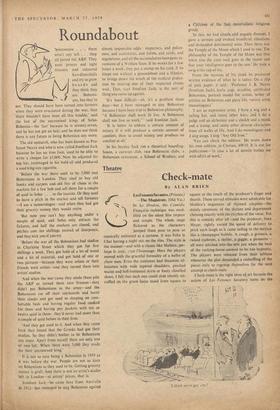Roundabout
'BOHEMIANS . . . there aren't any left . . . they all- joined the ARP. They wear jerseys and tight trousers and coloured hand kerchiefs and try to grow beards and they think they are Bohemi- ans, but they're not. They should have been turned into farmers when they were evacuated during the war, then there wouldn't have been all this trouble,' said the last of the uncrowned kings of Soho- Bohemia‚ÄĒthe 'last' because he is seventy-seven, and he has not got an heir, and he does not think there is any future in being Bohemian any more. The old monarch, who has been known as Pro- fessor Neave and who is now called Ironfoot Jack because he has an iron foot, used to be able to write a cheque for ¬£5,000. Now he adjusted his top hat, rummaged in his hold-all and produced a used king-size cigarette.
'Before the war there used to be 5,000 real Bohemians in London. They used to buy old books and carpets and old bits of china at the markets for a few bob and sell them for a couple of quid in Soho . . . to the tourists. Or they used to have a pitch in the market and tell fortunes ‚ÄĒI am a numerologist‚ÄĒand when they had got their grocery money they would retire.
`But now you can't buy anything under a couple of quid, and Soho only attracts the failures, and half the markets are closed, and pitches cost ten shillings instead of fourpence, and they nick you if you try.
'Before the war all the Bohemians had studios in. Charlotte Street which they got for five shillings a week. They got hold of a bit of wood and a bit of material, and got hold of one or two pictures‚ÄĒbecause they were artists or their friends were artists‚ÄĒand they turned them into artists' studios.
'And when the war came they made them join the ARP or turned them into firemen‚ÄĒthey didn't put Bohemians in the army‚ÄĒand the Bohemians cut off their sideboards and burnt their cloaks and got used to sleeping on com- fortable beds and having regular food cooked for them and having pay packets with ten or twelve quid in them they'd never had more than a couple of quid before in their lives.
'And they got used to it. And when they came back they found that the Greeks had got their studios. So they didn't bother to be Bohemians any more..Apart from myself there are only one or two left. When there were 5,000 they made me their uncrowned king.'
It is not so easy being a Bohemian in 1959 as it was before the war. People are not so keen on Bohemians as they used to be. Getting grocery money is graft. And there is not an artist's studio left in London‚ÄĒat artists' prices, that is.
Ironfoot Jack‚ÄĒhe came here from Australia in 1912‚ÄĒhas managed to stay Bohemian against almost impossible odds: inspectors, and police- men, and authorities, and forms, and cards, and regulations, and all the accumulative bourgeois in- ventions of a Welfare State. If he works for a few hours a week, they put a stamp on his card. If he sleeps out without a groundsheet and a blanket, he brings down the wrath of the medical profes- sion by making one of their respected clients wait. That, says lronfoot Jack, is the sort of thing you come up against.
`It's been difficult‚ÄĒoh, it's a problem these days‚ÄĒbut I have managed to stay Bohemian because I have been true to Bohemian philosophy. "A Bohemian shall work to live. A Bohemian shall not live to work,"' said Ironfoot Jack.
'It is better to endure a certain amount of misery if it will produce a certain amount of comfort, than to avoid misery and produce no comfort at all,' In his heyday Jack ran a theatrical boarding- house, a caravan club, two Bohemian clubs, a Bohemian restaurant, a School of Wisdom, and a Children of the Sun materialistic religious grotip.
'In this, we had rituals and pagoda dancers. I gave a sermon and evoked beneficial vibrations and disbanded detrimental ones. Then there was the Temple of the Moon which I used to run. The philosophy of the Temple of the Moon was that when you die your soul goes to the moon and that your intelligence goes to the sun.' He took a swig at his cup of tea.
From the recesses of his cloak he produced written evidence of what he is today. On a slip of pink paper, it said : 'Professor J. R. Neave (lronfoot Jack), karia yogi, occultist, celebrated Bohemian, portrait model for artists, writer of articles on Bohemian and gipsy life, variety artist (monologues).'
'I am an expression 'artist. I have a wig and a sailing hat, and many other hats; and I do a judge and an alchemist and a sheikh and a monk and a tramp, and many other diverse characters from all walks of life. And I do monologues and I sing songs. I sing "Any Old Iron."
'You can check the address.' He wrote down hiS own address, in Chelsea, SWIG. It is not for publication‚ÄĒ'in case a lot of nitwits bother me with offers of work.'






































 Previous page
Previous page